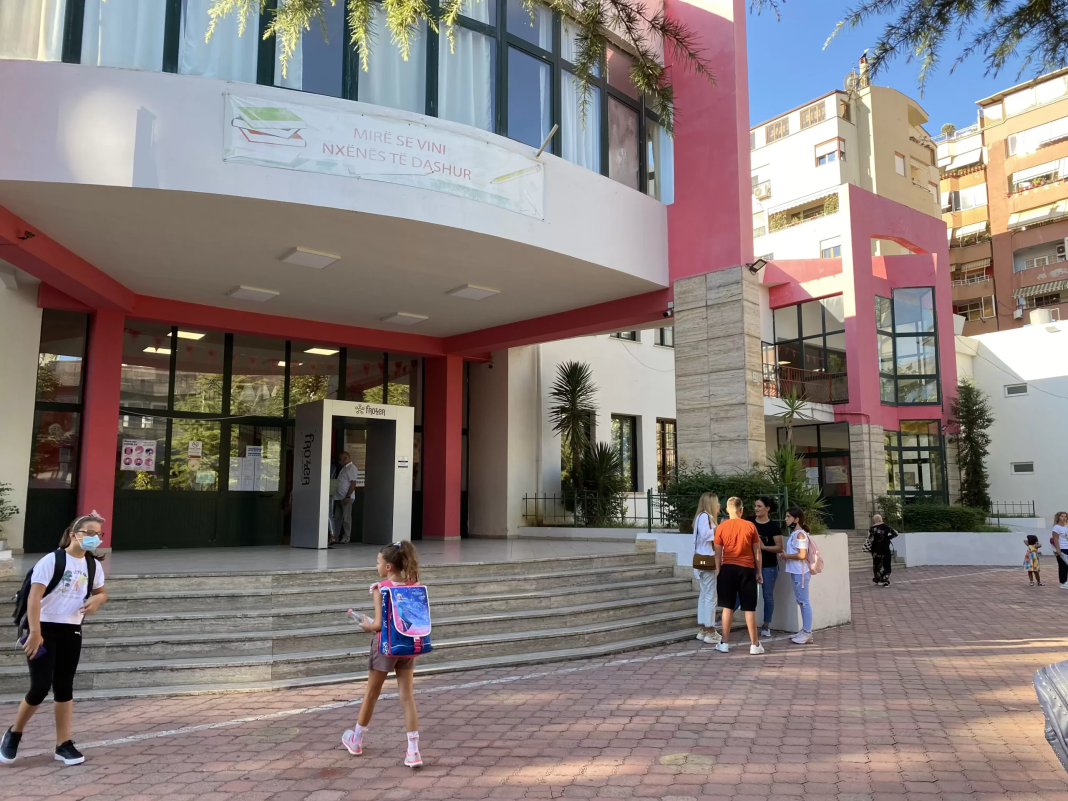Ilda Hoxha
Textbooks, adapted from British curricula a decade ago, are in urgent need of review, but experts stress that the development of education is also being held back by the lack of digital infrastructure in schools.
Suela, a mother of a sixth-grade pupil at ‘Kosova’ school in the capital, points out that although schoolbooks are advertised as free, parents seeking new textbooks must pay out of their own pockets.
Suela said she spent 5,800 Lekë on textbooks for her daughter this school year, but that isn’t her main concern. What worries her more than the cost is the poor quality of the school textbooks, which often contain logical mistakes and are not suited to the Albanian context.
‘Most of the textbooks are translations,’ Suela complains. ‘They have endless issues, from spelling mistakes to content errors’, she added, calling for their revision.
Merita, a teacher with over 15 years of experience in the education system, agrees, stating that the school textbooks are inadequate.
‘It is crucial that the voice of teachers is heard before reforms [and] changes in education legislation are made,’ she said, adding that there should be a standardization of textbooks across both public and private education.
Suela and Merita are not alone. Data collected by Faktoje through an online survey indicate that 63% of parents who completed the questionnaire and 61% of teachers are dissatisfied with the quality of school textbooks in Albania.

Experts indicate that Albanian school textbooks are translations from the UK but have not been updated in at least a decade.
‘When these textbooks were obtained from the UK, the greatest promise was that they would promote creative and critical thinking,’ recalled education expert Ndriçim Mehmeti.
‘Yet, in reality, the opposite occurred,’ he added, noting that according to the OECD’s PISA test, Albania scored only 13 points in critical thinking and ranked last.
Mehmeti clarified that the textbooks date back to 2007 and 2013, meaning they are outdated and have not been refreshed.
‘A large portion of the textbooks fails to provide knowledge appropriate for the targeted age group, contains very few topics on digital skills, and offers limited opportunities for practical training for students,’ he said.
‘The time has come—indeed, it is long overdue—for these textbooks to be revised and for a thorough reform to be implemented, including the initial training of teachers, their ongoing professional development, qualifications, and so forth,’ Mehmeti stated.
Activist Kolindo Vjerdha from the ‘Qëndresa Qytetare’ (Civic Resistance) organization believes that the instability in curriculum development remains a significant issue within the Albanian education system, stressing that frequent changes have led to difficulties for both students and teachers.
‘In our assessments, we have observed a mismatch and a lack of adaptation of school textbooks to the Albanian context,’ Vjerdha said.
‘It is essential for students in public schools across the country to have access to parts of their curriculum and learning methods that enable them to perform well, and this should also be reflected in reliable international measurements,’ he emphasized.
When asked earlier about this issue, the Ministry of Education and Sports revealed that textbooks in pre-university education are in a continuous process of improvement, which may also be related to possible changes in the curriculum.
‘The textbooks selected for use in pre-university education do not have issues that contradict the approved curriculum or programs,’ the Ministry stated, adding that the content of these textbooks aligns with the curriculum and subject programs.
‘The review of the textbooks involves improving various illustrations, correcting expressions, and addressing any spelling errors, among other elements,’ the Ministry of Education added.
In a statement made two years ago, former Minister of Education and Sports Evis Kushi also acknowledged that school textbooks needed enhancements.
‘Even though the textbooks we have now, translated from Oxford, Cambridge, and Pearson, are far superior in quality compared to those we used to have, we remain fully aware that there is still a need for numerous improvements,’ stated former Minister Kushi.
Missing digital infrastructure
The results of the ‘PISA 2022’ International Student Assessment, published in December 2023, show that Albania ranks 62nd out of 80 participating countries.
In mathematics, Albania scored 368 points out of a possible 472. This represents a decline of 69 points compared to the ‘PISA 2018’ results, the steepest drop among the 80 nations assessed.
For reading skills, 15-year-old students in Albania received a score of 358 points, with the average potential score being 476 points. This marks a decrease of 47 points when compared to the 2018 results.
‘Mediating the effectiveness and productivity of education in Albanian schools through the lens of PISA results clearly indicates that the existing curricula and teaching methodologies are not yielding effective outcomes,’ said Kolindo Vjerdha.
Through the questionnaire published on the ECR platform, Faktoje collected the opinions of dozens of parents and teachers regarding the state of education in Albania.
Some of the concerns raised by these two groups include low funding for education, lack of infrastructure, laboratories, libraries, overcrowded classrooms, and the absence of support and training for teachers.
‘The basic education system has many problems that we, as specialists, have pointed out, which unfortunately have also been confirmed by international organizations,’ said Ndriçim Mehmeti.
‘We still have not fully equipped all of Albania with digital infrastructure,’ he added.
Nanila Allkja Biçaku, the editor-in-chief of the School Portal, shared with Faktoje that many teachers are experiencing difficulties in utilizing technology in schools.
‘Many teachers have not adapted to using technology and the new SMIP system in education, and according to a survey we conducted, 87% of teachers indicate that they use their own technological devices to carry out their tasks,’ she noted.
‘Thus, there is still a lack of technological infrastructure in schools, which are referred to as digitalized schools,’ Biçaku added.
In addition to technology, parents and teachers reported challenges with heating, overcrowded classrooms, a lack of safe transportation for children, and the unavailability of facilities for students with different abilities and needs.
‘Parents and teachers are the ones who confront the issues and difficulties of the education system in the country every day,’ stated Kolindo Vjerdha.
‘We are neither progressing nor can we regard ourselves as part of the technological trend of the decade when public schools still operate with a ratio of 1 computer for every 20 students,’ he concluded.
Political Will
Edvina, a mother of a son enrolled at the ‘Ali Demi’ school in Tirana, expressed concerns not only about problematic textbooks but also about the shift system in place. She stressed the importance of increasing the number of schools in the capital’s center.
‘There shouldn’t be 40 students in a classroom with 2 shifts; ideally, there should be a maximum of 25 students per class,’ she said.
Data collected by Faktoje from the online questionnaire indicate that 31% of parents reported that their children continue to attend classes in shifts in the capital.

‘The majority of teachers, due to the heavy demands placed on them—with reports, documents, and the need to manage 40 students every hour—often forget to properly fulfill their role as educators,’ Edvina said.
‘There is a need for continuous training for teachers, not only in teaching practices but also in psychological training,’ she added.
Education expert Ndriçim Mehmeti highlights that initiating change in the education system requires political will for its depoliticization and an increase in funding from the state budget.
‘Our schools have become politicized to the very last detail,’ Mehmeti stated.
‘There is a significant lack of professionalism and an inability to take effective measures that can lead to positive outcomes,’ he noted, emphasizing that no measure will be effective ‘as long as the Ministry of Education is viewed as a comfortable refuge for political agendas.’










